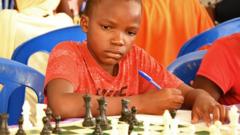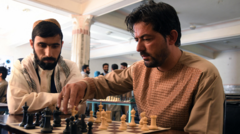Robert Katende's SomChess Academy in Katwe, Uganda, a neighborhood immortalized by the film "Queen of Katwe," continues to champion the game of chess among local youth, despite battling significant financial obstacles. For over 20 years, Katende has dedicated himself to empowering children through chess, which he sees not just as a game, but as a valuable educational tool.
After initially volunteering in the area as a football coach, Katende pivoted to chess, starting with a single chessboard in 2004. His determination bore fruit when nine-year-old Phiona Mutesi, a school dropout, joined and eventually became a national and international chess champion, even earning the title of Woman Candidate Master from the World Chess Federation. Mutesi’s story inspired the film, which featured actress Lupita Nyong'o as her mother.
Katende notes that Mutesi's journey exemplifies the transformative impact of chess, instilling resilience and life skills that lead players like 18-year-old Patricia Kawuma to scholarships and personal achievements. Kawuma, a two-time national junior chess champion, has benefitted from prize winnings that allowed her to fund her education and support her siblings.
With over 4,000 children passing through his program, which expanded from local schools to prisons and slums across East Africa, Katende’s influence is profound. However, the academy faces a daunting reality following the financial loss of the Disney film, which was expected to provide significant support. After investing $15 million, Disney reported losses, leading to a fallout that left Katende and his team without anticipated funding.
Despite this setback, he remains optimistic. Increased visibility from the film has drawn international partners and funding for various initiatives in Uganda and beyond. Nonetheless, the pandemic exacerbated existing financial constraints, forcing Katende to reduce his staff and operations significantly.
Currently, around 2,500 children and 800 inmates are enrolled in programs that teach them strategic thinking and life skills through chess. However, resources are scarce, with 120 boards for thousands of players. Recent stories of young talents, like current junior champion Jovan Kasozi, illustrate the tough decisions faced by aspiring chess players in Uganda, as financial support remains elusive.
As Katende looks to the future, he hopes that Disney will eventually turn a profit and share the benefits, allowing his programs to thrive again. In the meantime, he continues to cultivate the next generation of chess champions, understanding that, much like chess itself, life requires patience and strategy to navigate challenges.



















